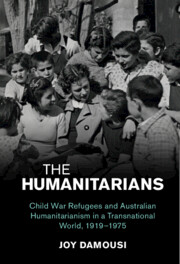 The Humanitarians
The Humanitarians Introduction
War Refugee Children, Humanitarianism and Transnationalism
Published online by Cambridge University Press: 28 July 2022
Summary
In November 1919, the Adelaide Advertiser reported that, among the Australian troops who had disembarked from the warship Port Sydney returning from the theatre of war, was a Belgian boy. Described as a ‘diminutive figure’, dressed in an Australian military uniform, the twelve-year-old became known as Albert. It was reported that his father had been killed while serving in the Belgian army and his mother had died of starvation, and that an Australian soldier, Private George Leahy, had ‘adopted’ him. Albert was referred to as a ‘war waif’.1 After being snatched from the battlefields of Europe, Albert Dussart remained in Australia for the rest of his life. Leahy had, according to these reports, stuffed him in his chaff bag and brought him to Australia. Tasmanian newspaper the World reported that the story ‘is surely one of the most human and touching that the whole of the war has produced’.2
- Type
- Chapter
- Information
- The HumanitariansChild War Refugees and Australian Humanitarianism in a Transnational World, 1919–1975, pp. 1 - 20Publisher: Cambridge University PressPrint publication year: 2022
